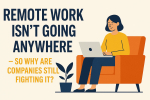Remote Work Isn’t Going Anywhere - So Why Are Companies Still Fighting It? Ref: 452
Date: Sun Sun 17 Aug 2025 22:50, 22:50Not long ago, “working from home” was code for taking the day off. Managers rolled their eyes, colleagues assumed you were in pyjamas binging Netflix, and HR quietly worried about productivity falling off a cliff.
Fast-forward a few years: millions of people worked remotely, businesses didn’t collapse, and guess what? In many cases, productivity went up. Yet, here we are in 2025, with CEOs pounding tables, insisting that “real work” only happens in fluorescent-lit cubicles surrounded by passive-aggressive kitchen notes.
The question recruiters and jobseekers alike should be asking is simple: why are some companies still fighting the inevitable?
Employees Have Spoken (Loudly)
The data isn’t ambiguous. Poll after poll shows employees overwhelmingly want flexibility. Hybrid or remote-first roles consistently attract more candidates than their office-only counterparts. And let’s be honest — who’s volunteering for a two-hour commute so they can spend all day on Zoom calls from a desk that isn’t even their own?
The talent market has flipped. Before the pandemic, remote jobs were seen as a luxury. Now, office-only jobs are the anomaly, and often viewed as red flags. If a company is clinging to rigid policies, candidates will ask themselves: If they don’t trust me to work from home, what else don’t they trust me with?
Productivity Panic: A Myth That Won’t Die
Despite years of evidence, some executives still cling to the myth that productivity is born in open-plan offices where distraction is king. They talk about “synergy” and “water cooler moments” like it’s 1998.
Here’s the reality:
-
Remote workers log longer focused hours.
-
Performance-based metrics don’t collapse just because someone isn’t under physical supervision.
-
Collaboration tools exist that make communication smoother than shouting across a desk ever was.
If the only way a business can measure performance is by seeing how many chairs are filled, then the problem isn’t remote work — it’s management.
The New Recruitment Divide
Recruiters are already seeing the consequences. Office-only companies are:
-
Bleeding talent to competitors with flexible policies.
-
Struggling to fill vacancies because candidates simply swipe past them.
-
Paying more in salaries to compensate for the lack of flexibility.
Meanwhile, remote-friendly businesses are enjoying wider talent pools, better retention, and in some cases, lower wage pressure thanks to location flexibility. In short, flexibility has become a recruitment weapon.
Let’s Talk Money (Because Employers Do)
Flexibility isn’t just about morale; it’s about pounds and pence.
-
Employers save millions by downsizing office space.
-
Employees save thousands on commuting, lunches, and dry cleaning.
-
Sustainability goals are magically supported when fewer people are forced to drive to offices every day.
It’s not just a perk. It’s a genuine competitive advantage.
The “Back to the Office” Blunder
So why are some multinationals pushing so hard for office returns? Ego. Habit. Control. Pick your poison.
Some leaders miss the bustling office as a symbol of power. Others don’t trust what they can’t see. A few are simply nostalgic for the way things were. But when nostalgia costs you your best employees, it’s not strategy — it’s stubbornness.
In fact, many workers see the push back to offices as tone-deaf. With housing costs exploding and transport prices climbing, insisting on full-time office presence feels less like teamwork and more like punishment.
Remote Work: The New Normal (Whether You Like It or Not)
Here’s the blunt truth: remote work isn’t a fad. It’s a structural shift in how work is organised, just like the Industrial Revolution or the rise of computers. Trying to undo it is like trying to un-invent the internet.
Recruiters, HR professionals, and forward-thinking companies have already adjusted. The rest? They’re setting themselves up for irrelevance.
Final Thought: Stop Fighting. Start Adapting.
If you’re a recruiter, you’ve already noticed it: when you list a job as “remote,” applications pour in. When you list it as “office only,” you may as well put up a sign that says: Applicants must enjoy traffic jams and awkward small talk.
So to the companies still waging war on remote work: be careful. While you drag employees back to the office, your competitors are quietly snapping up the very talent you’re struggling to keep.
And to candidates: if a company insists you must be in the office five days a week, ask yourself: Is this really a progressive place to grow my career — or just an organisation stuck in the past?
👉 Remote work isn’t a perk. It’s the present - and the future. The sooner businesses accept that, the better their chances of surviving in a talent market that has already moved on.

